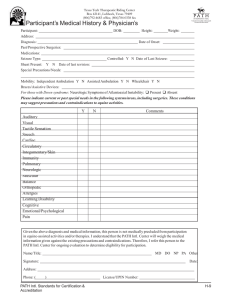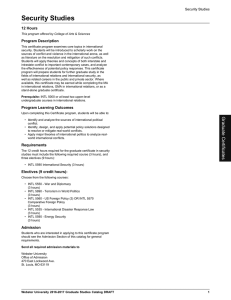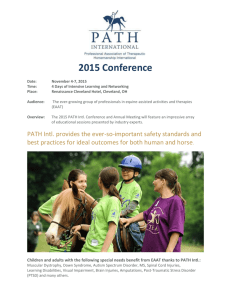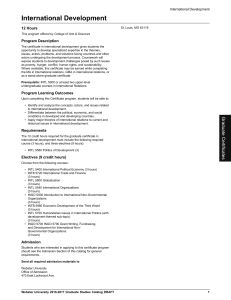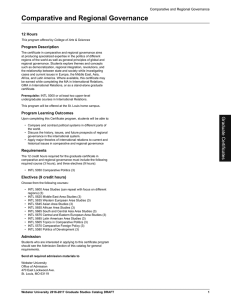INTL - International Relations
advertisement
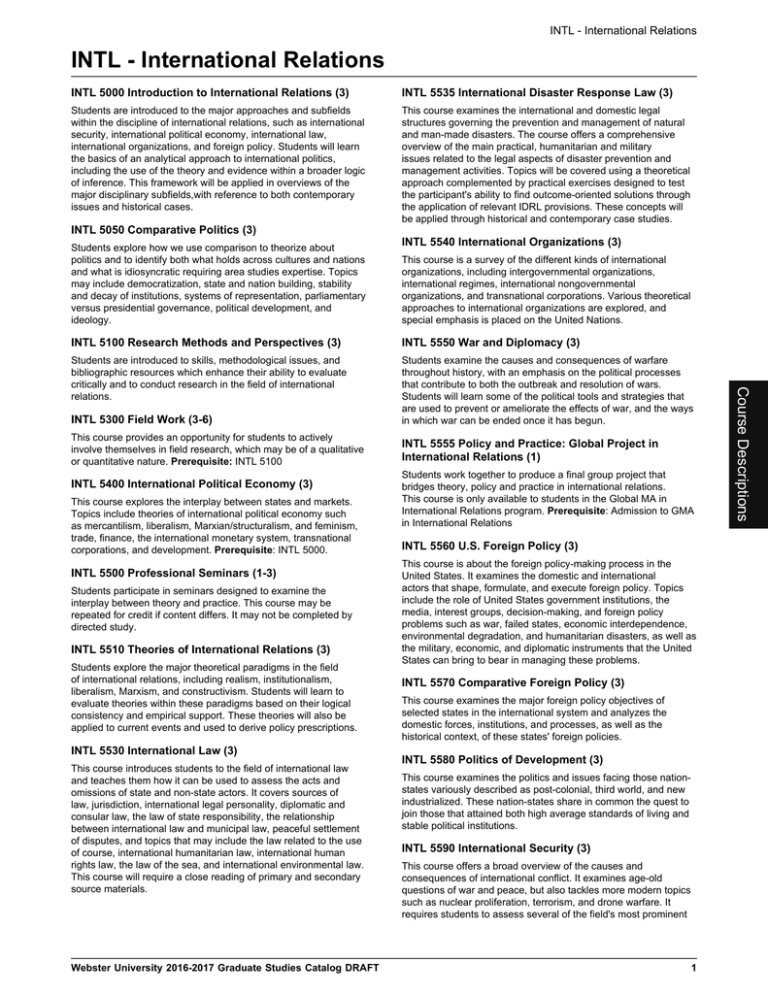
INTL - International Relations INTL - International Relations INTL 5000 Introduction to International Relations (3) INTL 5535 International Disaster Response Law (3) Students are introduced to the major approaches and subfields within the discipline of international relations, such as international security, international political economy, international law, international organizations, and foreign policy. Students will learn the basics of an analytical approach to international politics, including the use of the theory and evidence within a broader logic of inference. This framework will be applied in overviews of the major disciplinary subfields,with reference to both contemporary issues and historical cases. This course examines the international and domestic legal structures governing the prevention and management of natural and man-made disasters. The course offers a comprehensive overview of the main practical, humanitarian and military issues related to the legal aspects of disaster prevention and management activities. Topics will be covered using a theoretical approach complemented by practical exercises designed to test the participant's ability to find outcome-oriented solutions through the application of relevant IDRL provisions. These concepts will be applied through historical and contemporary case studies. INTL 5050 Comparative Politics (3) Students explore how we use comparison to theorize about politics and to identify both what holds across cultures and nations and what is idiosyncratic requiring area studies expertise. Topics may include democratization, state and nation building, stability and decay of institutions, systems of representation, parliamentary versus presidential governance, political development, and ideology. INTL 5540 International Organizations (3) This course is a survey of the different kinds of international organizations, including intergovernmental organizations, international regimes, international nongovernmental organizations, and transnational corporations. Various theoretical approaches to international organizations are explored, and special emphasis is placed on the United Nations. INTL 5550 War and Diplomacy (3) Students are introduced to skills, methodological issues, and bibliographic resources which enhance their ability to evaluate critically and to conduct research in the field of international relations. INTL 5300 Field Work (3-6) Students examine the causes and consequences of warfare throughout history, with an emphasis on the political processes that contribute to both the outbreak and resolution of wars. Students will learn some of the political tools and strategies that are used to prevent or ameliorate the effects of war, and the ways in which war can be ended once it has begun. This course provides an opportunity for students to actively involve themselves in field research, which may be of a qualitative or quantitative nature. Prerequisite: INTL 5100 INTL 5555 Policy and Practice: Global Project in International Relations (1) INTL 5400 International Political Economy (3) This course explores the interplay between states and markets. Topics include theories of international political economy such as mercantilism, liberalism, Marxian/structuralism, and feminism, trade, finance, the international monetary system, transnational corporations, and development. Prerequisite: INTL 5000. INTL 5500 Professional Seminars (1-3) Students participate in seminars designed to examine the interplay between theory and practice. This course may be repeated for credit if content differs. It may not be completed by directed study. INTL 5510 Theories of International Relations (3) Students explore the major theoretical paradigms in the field of international relations, including realism, institutionalism, liberalism, Marxism, and constructivism. Students will learn to evaluate theories within these paradigms based on their logical consistency and empirical support. These theories will also be applied to current events and used to derive policy prescriptions. INTL 5530 International Law (3) This course introduces students to the field of international law and teaches them how it can be used to assess the acts and omissions of state and non-state actors. It covers sources of law, jurisdiction, international legal personality, diplomatic and consular law, the law of state responsibility, the relationship between international law and municipal law, peaceful settlement of disputes, and topics that may include the law related to the use of course, international humanitarian law, international human rights law, the law of the sea, and international environmental law. This course will require a close reading of primary and secondary source materials. Webster University 2016-2017 Graduate Studies Catalog DRAFT Students work together to produce a final group project that bridges theory, policy and practice in international relations. This course is only available to students in the Global MA in International Relations program. Prerequisite: Admission to GMA in International Relations INTL 5560 U.S. Foreign Policy (3) This course is about the foreign policy-making process in the United States. It examines the domestic and international actors that shape, formulate, and execute foreign policy. Topics include the role of United States government institutions, the media, interest groups, decision-making, and foreign policy problems such as war, failed states, economic interdependence, environmental degradation, and humanitarian disasters, as well as the military, economic, and diplomatic instruments that the United States can bring to bear in managing these problems. INTL 5570 Comparative Foreign Policy (3) This course examines the major foreign policy objectives of selected states in the international system and analyzes the domestic forces, institutions, and processes, as well as the historical context, of these states' foreign policies. INTL 5580 Politics of Development (3) This course examines the politics and issues facing those nationstates variously described as post-colonial, third world, and new industrialized. These nation-states share in common the quest to join those that attained both high average standards of living and stable political institutions. INTL 5590 International Security (3) This course offers a broad overview of the causes and consequences of international conflict. It examines age-old questions of war and peace, but also tackles more modern topics such as nuclear proliferation, terrorism, and drone warfare. It requires students to assess several of the field's most prominent 1 Course Descriptions INTL 5100 Research Methods and Perspectives (3) INTL - International Relations INTL - International Relations theories of conflict, coercion, bargaining, and cooperation in terms of both historical and contemporary case studies. INTL 5595 Energy Security (3) This course will examine the geopolitics of energy, emphasizing the security implications of global energy markets and resource competition. The course explores the ways that states shape their grand strategies to meet their energy needs, and the impact of these strategies on regional and global politics. The course will also look into the geopolitical, environment and domestic factors that drive energy policy decisions. Students will examine problems in energy security using both long-term and short-term perspectives. Students will learn how states balance long-term investments to secure energy supply against the short-term need to ensure a supply network's capacity to withstand short-term interruptions and shocks. INTL 5675 Central and Eastern Europe Area Studies (3) Students examine the history, culture, politics, and economic systems of Russia and Eastern Europe not defined by a specific departmental course offering. INTL 5685 Latin American Area Studies (3) Students examine the history, culture, politics, and economic systems of Latin America not defined by a specific departmental course offering. INTL 5700 Humanitarian Issues in International Politics (3) This course provides a forum for investigating transnational humanitarian issues such as regionalism, the environment, human rights, and refugees. Course may be repeated for credit if content differs. INTL 5600 Area Studies (3) Students examine the history, culture, politics, and economic systems of a region or sub-region not defined by a specific departmental course offering. INTL 5605 Topics in Comparative Politics (3) Specific topics in comparative politics are examined in depth. Topics may be issues such as democratization, military politics, migration, or health care policies, examined using a cross-national approach of the politics of a specific nation or set of nations chosen for comparison. INTL 5800 Globalization (3) Globalization involves the intensification of economic, political, social, and cultural relations across international borders. This course examined the history and causes of this process and evaluates the effects it has on relationships within and between countries. INTL 5860 Issues in International Politics (3) This course examines such issues as terrorism, the control of weapons of mass destruction, illicit trade, imperialism, and conflict resolution. Course may be repeated for credit if content differs. INTL 5610 Non-Thesis Readings/Research (3) Non-Thesis Readings/Research is an intensive, one-on-one reading/research course. Students work in close cooperation with an individual professor on a topic of special interest. The content of this course may not duplicate other courses in the curriculum. The policies and procedures that apply to Non-Thesis Readings/ Research are those for directed studies. Course may be repeated for credit if content differs. INTL 5870 International Law and Politics of Outer Space (3) This course examines the international law and politics of outer space. It focuses on the law that has emerged in this area in recent decades, and how it has emerged. Topics covered include space exploration, space travel, questions of sovereign appropriation, and peaceful settlement of disputes. INTL 5625 Middle East Area Studies (3) INTL 5890 Terrorism in World Politics (3) Students examine the history, culture, politics, and economic systems of the Middle East not defined by a specific departmental course offering. This course examines the causes and political responses to terrorism in world politics. Issues examined may include the origins and goals of major terrorist organizations, tensions that arise between protecting civil liberties and ensuring security when responding to terrorism, and how to distinguish between terrorism and other forms of violence. INTL 5635 Western European Area Studies (3) Students examine the history, culture, politics, and economic systems of Western Europe not defined by a specific departmental course offering. INTL 5645 Asian Area Studies (3) Students examine the history, culture, politics, and economic systems of Asia not defined by a specific departmental course offering. INTL 5655 African Area Studies (3) Students examine the history, culture, politics, and economic systems of Africa not defined by a specific departmental course offering. INTL 5665 South and Central Asia Area Studies (3) Students examine the history, culture, politics, and economic systems of South and Central Asia not defined by a specific course offering. 2 INTL 5900 Advanced Research Methods (3) This course builds upon INTL 5100 by providing additional analytical and theoretical background relating to research methods, data analysis, qualitative techniques, and statistical theory. Prerequisite: INTL 5100. INTL 6000 Capstone in International Relations (3) This course centers on the design and development of a scholarly capstone paper, representing the student's achievement as a Master of International Relations. Prerequisite: Completion of 30 credit hours prior to registering for INTL 6000 Capstone in International Relations. INTL 6250 Thesis (6) The student completes a thesis project under the supervision of two faculty members. The thesis option is recommended for those considering graduate study at the doctoral level. All theses must follow university guidelines and be deposited in the Webster University library. Proposal forms are available from the department web site. Students must secure approval of Webster University 2016-2017 Graduate Studies Catalog DRAFT INTL - International Relations INTL - International Relations their proposal from the academic director or coordinator of the program at the site where the thesis is to be done. General policy expects proposals to be submitted before the 24th credit hour is completed. Prerequisite: Completion of 30 credit hours prior to registering for INTL 6250 Thesis. INTL 6500 Internship (3-6) INTL 6500 Internship is designed to enhance the international relations curriculum. Students play an instrumental role in creating an experience that blends coursework knowledge with practical knowledge by working with a host organization under the supervision of a qualified professional. Thus, all work performed for the purpose of satisfying the requirements of the internship program must in some way relate to the field of international relations. Prerequisites: INTL 6500 Internship requires that the student complete all required courses for the Master of Arts (MA) in International Relations (except INTL 6000 Capstone in International Relations or INTL 6250 Thesis). Execptions may apply at the discretion of the Chair of History, Politics, and International Relations Department, upon written request, before registering for INTL 6500 Internship. INTL 6500 Internship cannot be substituted for INTL 6000 Capstone in International Relations or INTL 6250 Thesis. Course Descriptions INTL 6900 University Thesis Requirements (0) Required of all MA students completing a thesis project. All theses must follow university and departmental guidelines and be depositied in the University library. Recognizes successful completion of all the thesis requirements. Webster University 2016-2017 Graduate Studies Catalog DRAFT 3
